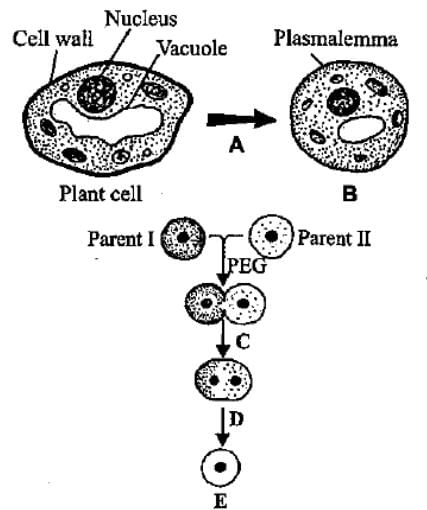NEET Exam > NEET Tests > Biology Practice Tests: CUET Preparation > Test: Tissue Culture (Old NCERT) - NEET MCQ
Test: Tissue Culture (Old NCERT) - NEET MCQ
Test Description
15 Questions MCQ Test Biology Practice Tests: CUET Preparation - Test: Tissue Culture (Old NCERT)
Test: Tissue Culture (Old NCERT) for NEET 2024 is part of Biology Practice Tests: CUET Preparation preparation. The Test: Tissue Culture (Old NCERT) questions and answers have been
prepared according to the NEET exam syllabus.The Test: Tissue Culture (Old NCERT) MCQs are made for NEET 2024 Exam. Find important
definitions, questions, notes, meanings, examples, exercises, MCQs and online tests for Test: Tissue Culture (Old NCERT) below.
Solutions of Test: Tissue Culture (Old NCERT) questions in English are available as part of our Biology Practice Tests: CUET Preparation for NEET & Test: Tissue Culture (Old NCERT) solutions in
Hindi for Biology Practice Tests: CUET Preparation course. Download more important topics, notes, lectures and mock
test series for NEET Exam by signing up for free. Attempt Test: Tissue Culture (Old NCERT) | 15 questions in 15 minutes | Mock test for NEET preparation | Free important questions MCQ to study Biology Practice Tests: CUET Preparation for NEET Exam | Download free PDF with solutions
Test: Tissue Culture (Old NCERT) - Question 1
Select the correct statement out of the following.
Detailed Solution for Test: Tissue Culture (Old NCERT) - Question 1
Detailed Solution for Test: Tissue Culture (Old NCERT) - Question 2
| 1 Crore+ students have signed up on EduRev. Have you? Download the App |
Test: Tissue Culture (Old NCERT) - Question 3
Which of the following should be used as an explant to generate a disease free plant?
Detailed Solution for Test: Tissue Culture (Old NCERT) - Question 3
Detailed Solution for Test: Tissue Culture (Old NCERT) - Question 4
Detailed Solution for Test: Tissue Culture (Old NCERT) - Question 5
Test: Tissue Culture (Old NCERT) - Question 6
Given below is the flowchart showing the process of somatic hybridization. Identify A, B, C, D and E.

Detailed Solution for Test: Tissue Culture (Old NCERT) - Question 6
Detailed Solution for Test: Tissue Culture (Old NCERT) - Question 7
Detailed Solution for Test: Tissue Culture (Old NCERT) - Question 8
Test: Tissue Culture (Old NCERT) - Question 9
A somatic hybrid between potato and tomato is named as
Detailed Solution for Test: Tissue Culture (Old NCERT) - Question 9
Test: Tissue Culture (Old NCERT) - Question 10
Somatic hybrids in plants were first obtained between two species of _____ by Carlson et al. in 1972.
Detailed Solution for Test: Tissue Culture (Old NCERT) - Question 10
Test: Tissue Culture (Old NCERT) - Question 11
In plant tissue culture, cytokinins are responsible for the growth of
Detailed Solution for Test: Tissue Culture (Old NCERT) - Question 11
Test: Tissue Culture (Old NCERT) - Question 12
Hormone responsible for growth of the root in micropropagation is
Detailed Solution for Test: Tissue Culture (Old NCERT) - Question 12
Test: Tissue Culture (Old NCERT) - Question 13
The enzymes required to obtain protoplast from a plant cell are
Detailed Solution for Test: Tissue Culture (Old NCERT) - Question 13
Test: Tissue Culture (Old NCERT) - Question 14
Match Column-I with Column-II and select the correct answer from the codes given below.

Detailed Solution for Test: Tissue Culture (Old NCERT) - Question 15
Information about Test: Tissue Culture (Old NCERT) Page
In this test you can find the Exam questions for Test: Tissue Culture (Old NCERT) solved & explained in the simplest way possible.
Besides giving Questions and answers for Test: Tissue Culture (Old NCERT), EduRev gives you an ample number of Online tests for practice

















